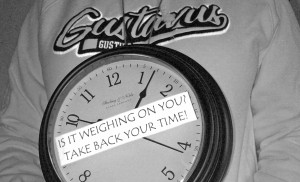
Last Friday, the Center for Vocational Reflection (CVR) enlisted 33 Gustavus students to hang nine-inch wall clocks around their necks that said, “Is it weighing on you? Take back your time.” The students wore the wall clocks in observance of national Take Back Your Time Day, which, according to the official website, is a “major U.S./Canadian initiative to challenge the epidemic of overwork, over-scheduling and time famine that now threatens our health, our families and relationships, our communities and our environment.”
This initiative supports paid vacation time and encourages over-worked Americans to relax, spend time doing things they love and cut out the things that they don’t. Take Back Your Time Day at Gustavus didn’t advocate for paid vacation time, but it had the same goal at heart—encouraging Gusties to relax and think intentionally about how they spend their time.
According to the CVR, the weight of the wall clock around a student’s neck along with the clock’s caption, “Is it weighing on you? Take back your time,” symbolizes the constant pressure that time exerts on students’ lives. The CVR wanted to make students more aware of this pressure and encourage them to think differently about their time.
“I wish that I could dwell in time with others without feeling guilty for not pursuing my own individual ambitions. We should not have to regret ‘giving’ our time to others. Time is not my own possession. Time is community possession. So what am I doing with our time?” said Hannah Twiton, a junior English major, who wore the clock.
In addition to the clocks, the CVR conducted a survey that asked students to share their schedules and answer a few questions in exchange for a free Take Back Your Time t-shirt. Out of the 57 students surveyed, 37 consider the demands on their time “just right,” 19 consider themselves “too busy,” and one considered him/herself “not busy enough.” These students were also asked what they wished they had more time to do. The most common answers were to spend time with friends, sleep, relax, study/do homework and work out.
“I would really like to take back some time for myself to actually get out and exercise. I always have the best intentions to do so, but by the time I finish all my homework and other commitments, all I want to do is sleep, and I don’t get enough of that as it is. This year I have been realizing that spending some time relaxing and hanging out with friends is just as important as doing homework, so I have been taking back time in that way,” said Carissa Keith, a junior religion major.
Other Gusties talked about taking back their time as well. Katelyn Johnson, a junior communication studies major, said, “I’m doing a great job of taking back my time, if I do say so myself. … I was hyper-involved during my sophomore year, and it was really stressful. On a typical Wednesday, I was in meetings and rehearsals from 4:30 to 11:00 p.m. … [W]ith the help of professors, family and friends, I have learned to cut back, to say ‘no’ and to make intentional time for the people I love and the activities that I enjoy. I don’t have it down to a science, but I am absolutely loving junior year because I’ve taken back my time and found a balance between studying, socializing and involving myself in extracurricular activities.”
Senior Communication Studies Major Luke Garrison said, “I try not to be involved with anything I’m not passionate about, and I do what I really enjoy, like make friendships and spend time with the people who are important to me. When things get busy, it is easy to let those things get lost in the shuffle, but I always try to make sure that they come first.”
The take back your time message reached beyond the Gustavus community. “I was walking to the Caf for lunch, and a woman walking next to me said, ‘You’re the second person I’ve seen wearing a clock. What’s it all about?’ So I explained that it was from the CVR to draw attention to Take Back Your Time Day. ‘You’re supposed to think about how you spend your time,’ I explained, ‘and if you want to spend that time on something else.’ The woman paused for a moment, then said, ‘I watch too much TV.’ I was a bit taken aback, but responded with ‘Yeah, see, maybe you could use that time to go on a walk or talk to your neighbors.’ ‘I should talk to my husband more,’” said Rebekah Schulz, a junior English education major.
Gustavus students also shared their thoughts about time in general. Kristin Weller, a junior theatre and dance major, said that thinking about how one spends time is important “because we get so little of it. It’s precious, and we change and age so fast.”
“Activity doesn’t necessarily mean productivity. Everyone should be intentional with their time, whether it’s studying, going to meetings, spending time with friends or doing nothing. People—Americans, in particular—associate ‘doing nothing’ with laziness, but rest is so important to having balance and sanity in your life. We should realize that it is ok to not always ‘do’ and [sometimes] just ‘be,’” Johnson said.